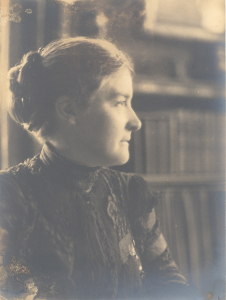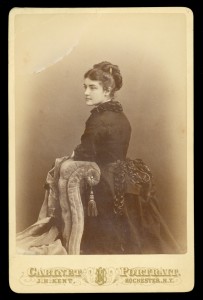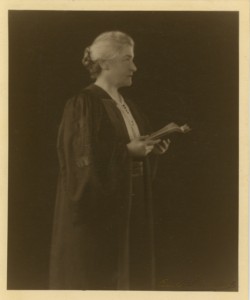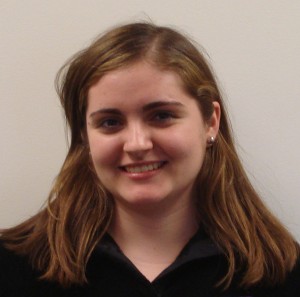 We have previously featured a radio broadcast of M. Carey Thomas (available in this post on the issue of single sex education today), but given the significant and perennial interest in her (and particularly her mannerisms) that we’ve noticed through talking to people about this project, I thought I’d feature it again.
We have previously featured a radio broadcast of M. Carey Thomas (available in this post on the issue of single sex education today), but given the significant and perennial interest in her (and particularly her mannerisms) that we’ve noticed through talking to people about this project, I thought I’d feature it again.
Thomas recorded this broadcast in 1935, just a few months before her death. By this stage she was a well practiced speaker, having given public orations on women’s education and suffrage for many years. She also gave chapel speeches to the students at Bryn Mawr which are warmly remembered in students accounts of their time at the college. What many may not be aware of is that Thomas undertook elocution lessons in order to perfect her oratory. As Helen Horowitz has written in excellent biography The Power and the Passion of M. Carey Thomas, she ‘hoped the world would see her [as] a woman of dignity and taste’ (page 227) and her professionalism while speaking was undoubtedly part of this.
Thomas’ regular and memorable chapel speeches to the students ranged from her personal ideas and experiences to more polemical speeches on the importance of the ‘Bryn Mawr standard’ and educational opportunities for women. She clearly had a vision of women in the public world, a role that could only be obtained through higher education and active participation in society.
In the radio broadcast, Thomas spoke about her own journey through education, how she had never come into contact with an educated woman in her childhood,  and how her mother’s friends offered expressions of sympathy rather than encouragement when she went to Europe to pursue her educational journey. As Thomas says, they would have been less scandalized if she had run away with the coachman than her decision to obtain higher education! It reminds us of the importance of role models in achieving ambitions; to be able to see someone achieve what you wish for makes it ultimately seem more possible for you and more acceptable for those who see it as out of the norm. Although women’s access to higher education in the US is no longer in question, this sentiment holds true: role models, mentors and successful examples are necessary to envision and realize goals, regardless of what they are.
and how her mother’s friends offered expressions of sympathy rather than encouragement when she went to Europe to pursue her educational journey. As Thomas says, they would have been less scandalized if she had run away with the coachman than her decision to obtain higher education! It reminds us of the importance of role models in achieving ambitions; to be able to see someone achieve what you wish for makes it ultimately seem more possible for you and more acceptable for those who see it as out of the norm. Although women’s access to higher education in the US is no longer in question, this sentiment holds true: role models, mentors and successful examples are necessary to envision and realize goals, regardless of what they are.
Thomas also highlights in the speech the objections made to women’s education at Bryn Mawr in its early years, with claims of physical incapacity resulting from the ‘strain’ of undertaking a degree, arguments which existed for centuries before Thomas’ own experiences and referred to in Michelle Smith’s (BMC ’12) post earlier on this blog. The societal expectations of women’s intellectual and physical capacity for higher education were low, and this may explain the detailed monitoring of student’s physical health in the early years of the college, proving that academic study could be combined with physical education to positive effect.
Thomas’ talk is a celebration of how far women had come in 1935 from her own days of education at the end of the nineteenth century, and her spirit of optimism and encouragement is something I feel is imbued in the overall spirit of The Albert M. Greenfield Digital Center for the History of Women’s Education. 
Click here to listen to M. Carey Thomas mcareythomas1935 and let us know what you think!
 OHA Annual Meeting in Cleveland, Ohio, October 10-14, 2012
OHA Annual Meeting in Cleveland, Ohio, October 10-14, 2012 




